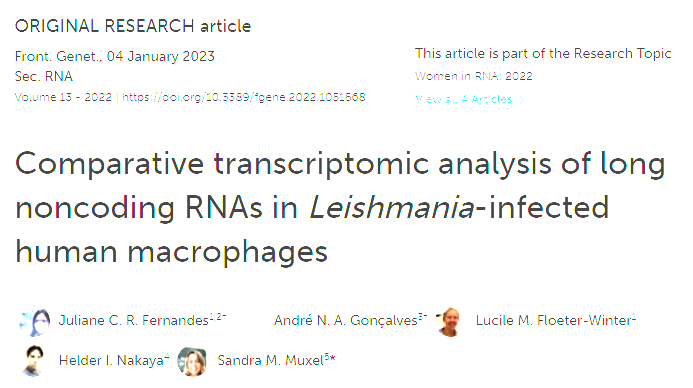Comparative transcriptomic analysis of long noncoding RNAs in Leishmania-infected human macrophages
It is well established that infection with Leishmania alters the host cell's transcriptome. Since mammalian cells have multiple mechanisms to control gene expression, different molecules, such as noncoding RNAs, can be involved in this process. MicroRNAs have been extensively studied upon Leishmania infection, but whether long noncoding RNAs (lncRNAs) are also altered in macrophages is still unexplored. We performed RNA-seq from THP-1-derived macrophages infected with Leishmania amazonensis (La), L. braziliensis (Lb), and L. infantum (Li), investigating a previously unappreciated fraction of macrophage transcriptome. We found that more than 24% of the total annotated transcripts and 30% of differentially expressed (DE) RNAs in Leishmania-infected macrophage correspond to lncRNAs. LncRNAs and protein coding RNAs with altered expression are similar among macrophages infected with the Leishmania species. Still, some species-specific alterations could occur due to distinct pathophysiology in which Li infection led to a more significant number of exclusively DE RNAs. The most represented classes among DE lncRNAs were intergenic and antisense lncRNAs. We also found enrichment for immune response-related pathways in the DE protein coding RNAs, as well as putative targets of the lncRNAs. We performed a coexpression analysis to explore potential cis regulation of coding and antisense noncoding transcripts. We identified that antisense lncRNAs are similarly regulated as its neighbor protein coding genes, such as the BAALC/BAALC-AS1, BAALC/BAALC-AS2, HIF1A/HIF1A-AS1, HIF1A/HIF1A-AS3 and IRF1/IRF1-AS1 pairs, which can occur as a species-specific modulation. These findings are a novelty in the field because, to date, no study has focused on analyzing lncRNAs in Leishmania-infected macrophage. Our results suggest that lncRNAs may account for a novel mechanism by which Leishmania can control macrophage function. Further research must validate putative lncRNA targets and provide additional prospects in lncRNA function during Leishmania infection
Authors
Fernandes JCR, Goncalves ANA, Floeter-Winter LM, Nakaya HI, Muxel SM.
External link
Publication Year
Publication Journal
Associeted Project
Long Noncoding RNAs
Lista de serviços
-
As antisense RNA gets intronic.As antisense RNA gets intronic.
-
Androgen responsive intronic non-coding RNAs.Androgen responsive intronic non-coding RNAs.
-
Conserved tissue expression signatures of intronic noncoding RNAs transcribed from human and mouse loci.Conserved tissue expression signatures of intronic noncoding RNAs transcribed from human and mouse loci.
-
The intronic long noncoding RNA ANRASSF1 recruits PRC2 to the RASSF1A promoter, reducing the expression of RASSF1A and increasing cell proliferation.The intronic long noncoding RNA ANRASSF1 recruits PRC2 to the RASSF1A promoter, reducing the expression of RASSF1A and increasing cell proliferation.
-
Antisense intronic non-coding RNA levels correlate to the degree of tumor differentiation in prostate cancer.Antisense intronic non-coding RNA levels correlate to the degree of tumor differentiation in prostate cancer.
-
Insight Into the Long Noncoding RNA and mRNA Coexpression Profile in the Human Blood Transcriptome Upon Leishmania infantum Infection.Insight Into the Long Noncoding RNA and mRNA Coexpression Profile in the Human Blood Transcriptome Upon Leishmania infantum Infection.
-
Long non-coding RNAs associated with infection and vaccine-induced immunityLong non-coding RNAs associated with infection and vaccine-induced immunity
-
Comparative transcriptomic analysis of long noncoding RNAs in Leishmania-infected human macrophagesComparative transcriptomic analysis of long noncoding RNAs in Leishmania-infected human macrophages
-
SARS-CoV-2 Selectively Induces the Expression of Unproductive Splicing Isoforms of Interferon, Class I MHC, and Splicing Machinery Genes.SARS-CoV-2 Selectively Induces the Expression of Unproductive Splicing Isoforms of Interferon, Class I MHC, and Splicing Machinery Genes.

